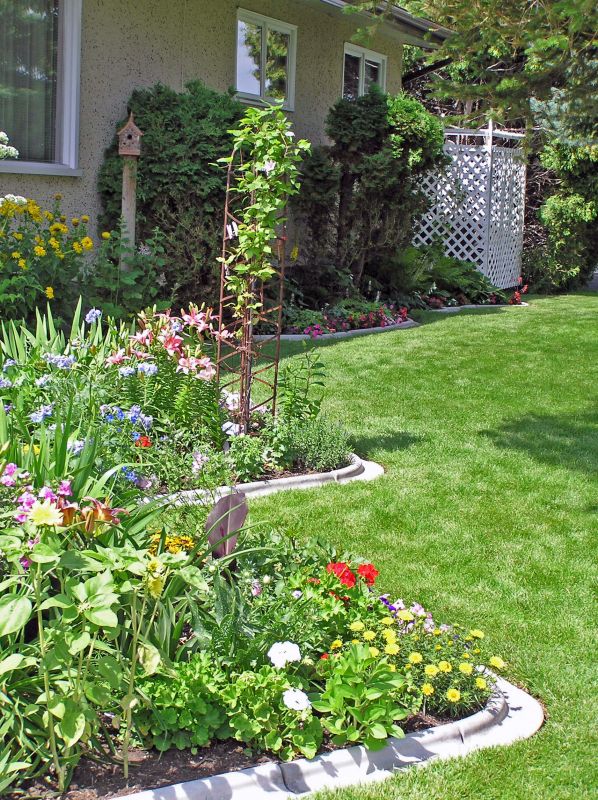Top-Rated Equipment For Cement Curbing To Achieve Precise Installations
Explore reliable tools and machinery that help achieve consistent, accurate, and efficient cement curbing results every time.
 Installing cement curbing can be an effective way to define landscape borders, create garden beds, or add decorative accents to outdoor spaces. The success of a cement curbing project often depends on selecting the right products and tools to ensure clean lines, durability, and ease of installation. From molds and forms to sealants and finishing tools, there are numerous options designed to accommodate various project sizes and complexities.
Installing cement curbing can be an effective way to define landscape borders, create garden beds, or add decorative accents to outdoor spaces. The success of a cement curbing project often depends on selecting the right products and tools to ensure clean lines, durability, and ease of installation. From molds and forms to sealants and finishing tools, there are numerous options designed to accommodate various project sizes and complexities.
Top Overall Option
Concrete Curbing Mold Kit
A comprehensive concrete curbing mold kit provides a versatile and user-friendly solution for creating consistent and attractive curb borders. These kits typically include multiple mold sizes and shapes, allowing for customization and varied designs. They are suitable for both novice DIY enthusiasts and experienced landscapers, offering durable construction and easy handling to facilitate smooth installation. The use of such kits can help achieve professional-looking results with minimal effort, making them a popular choice for a wide range of projects.
Types of Products For Cement Curbing Installations
Flexible Curbing Forms
Flexible forms adapt to curves and irregular shapes, making them ideal for decorative and custom designs. They are easy to install and remove, allowing for creative landscaping features.
Rigid Concrete Molds
Rigid molds provide precise shapes and sizes for uniform curb lines. They are durable and suitable for repetitive installations in larger projects.
Precast Concrete Edging
Precast concrete edging offers ready-to-install curb segments that simplify the process and ensure consistency across installations.
Mix and Pour Kits
Complete kits include all necessary components for mixing and pouring concrete, ideal for DIY projects and small-scale installations.
Sealants and Finishing Compounds
Sealants protect the cured curb from weathering, while finishing compounds help achieve a smooth surface and professional appearance.
Edging Tools and Trowels
Specialized tools assist in shaping, smoothing, and detailing the curb for a polished look.
Joint Fillers and Caulks
Used to fill gaps and joints, these products improve the curb's stability and appearance.
Reinforcement Mesh
Mesh reinforcement adds strength to the curb, reducing cracking and enhancing durability.
Color Additives
Colorants can be mixed into the concrete to add decorative hues and accents to the curb.
Form Liners and Texture Mats
These accessories impart decorative textures and patterns to the surface of the cured curb.
Form Release Agents
Used to prevent concrete from sticking to molds, ensuring clean removal and a smooth finish.
Popular Choices
Various mold options are trending for their ease of use and ability to produce consistent curb shapes.
Flexible kits are favored for their adaptability to curves and complex landscape contours.
Pre-packaged concrete mixes are popular for small projects and quick setups.
Specialized tools for shaping and finishing are commonly used to achieve smooth, defined edges.
Sealers are trending for their role in maintaining curb appearance and longevity.
Color additives are increasingly popular for decorative purposes and customization.
Products for filling and sealing joints are essential for finished curb durability.
Mesh reinforcement is widely used to enhance structural integrity of the curb.
Surface texturing tools are popular for adding decorative effects to curbing projects.
Cement curbing products come in a variety of forms, including pre-made molds, flexible forms, and customizable kits that allow for tailored designs. Proper preparation, such as surface cleaning and setting a stable base, enhances the longevity and appearance of the finished curb. Additionally, choosing the appropriate mix, additives, and finishing techniques can influence the final look and durability of the curb.
Whether undertaking a small residential project or a larger commercial installation, understanding the different product types and their specific applications can help ensure a smooth process. Accessories like edging tools, joint fillers, and protective sealants can further improve the quality and lifespan of the cement curb. Investing in high-quality, compatible products can make the installation more manageable and result in a professional-looking outcome.
Overall, selecting the right products for cement curbing installations involves considering the project's scope, desired aesthetic, and environmental conditions. Proper planning and the use of suitable tools and materials can help achieve a durable and visually appealing result that enhances outdoor landscapes.
Key Buying Considerations
- Project scope and size influence the choice of products, from small kits to large molds.
- Material durability and weather resistance are crucial for outdoor installations.
- Ease of use and handling should match your skill level and project complexity.
- Compatibility of molds and forms with your chosen concrete mix ensures better results.
- Flexibility in forms allows for custom shapes and curved designs, ideal for decorative features.
- Surface finish options, including textures and smoothness, depend on the tools and molds used.
- Reinforcement options can improve longevity but may add complexity and cost.
- Color additives and surface treatments enable customization and aesthetic appeal.
- Sealing and protective coatings help maintain appearance and prevent deterioration.
- Availability of replacement parts and accessories can affect long-term usability.
- Budget considerations should balance quality and project requirements.
- Environmental conditions, such as exposure to moisture or freeze-thaw cycles, impact material choice.
- Storage and handling requirements for molds and tools can influence ease of use.
- Compatibility with existing landscaping equipment or methods may be necessary.
- Manufacturer reputation and product reviews can provide insights into reliability and performance.
